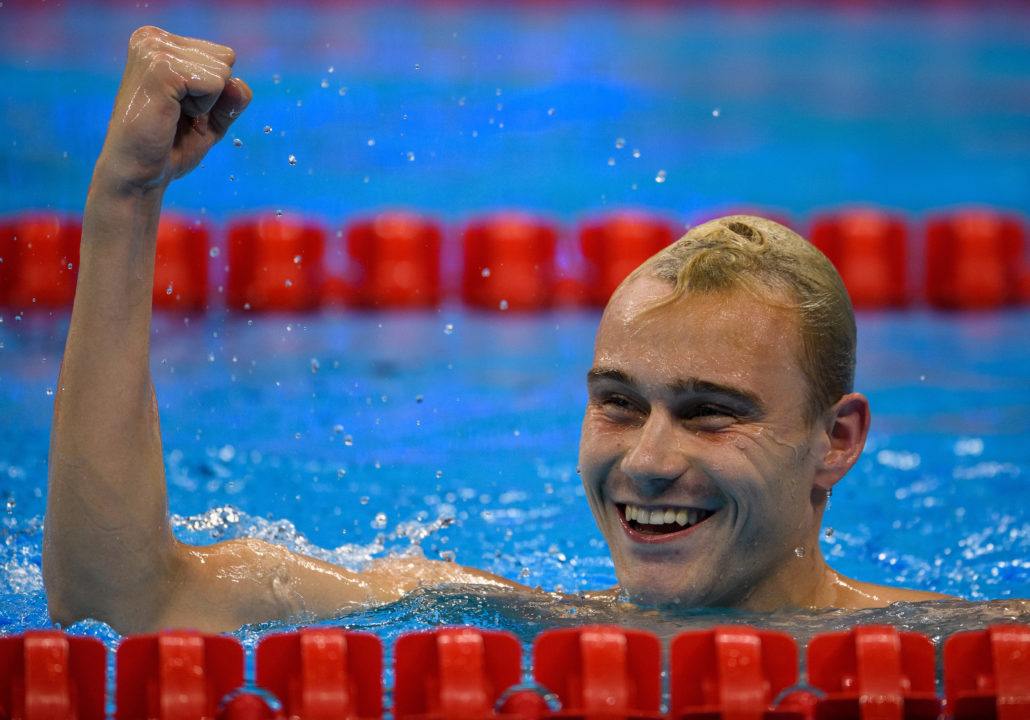British Paralympic champion Ollie Hynd has announced that he is taking a break from competitive swimming after being reclassified.
“Unfortunately I have had to make a really difficult decision following on from a challenging few years, regarding my classification and of course the impact that Covid has had on us all, as elite athletes,” Hynd wrote in a statement posted to his Twitter account. “For the moment, I will be stepping away from the programme and competitive swimming to focus on other initiatives and to ensure that my health and wellbeing are the main priority moving forward.”
“I would wholeheartedly like to thank my sponsors, teammates, coaching team and more importantly supporters, who have been instrumental in every achievement I have made in and out of the pool.”
“Although Tokyo 2021 isn’t my short term swimming plans, you never know what may be around the corner. Thank you again to all for being alongside me in what has been an awesome time!”
Brief statement regarding my immediate future in the sport. Thank you as always for the support @britishswimming pic.twitter.com/6HziGZGEy0
— Ollie Hynd MBE (@olliehyndgb) May 6, 2021
Hynd represented Great Britain at both the 2012 and 2016 Paralympic Games, winning gold medals in the S8 200 IM and S8 400m freestyle. However, at the Denmark Para World Series stop in 2018, Hynd was reclassified into the S9 category, meaning he would be racing less-impaired swimmers than he was in the S8 category. Although he appealed his reclassification in June 2018, he was later subjected to further testing and moved back to the S9 class before the 2018 Para Swimming European Championships.
At the time of his initial reclassification, Hynd released a statement saying he was “heartbroken and confused.”
Hynd has neuromuscular myopathy and several associated limb deformities. Neuromuscular myopathy is a degenerative condition, which weakens the muscles in Hynd’s legs.
Hynd’s reclassification came amid a new classification process implemented by the World Para Swimming Association on January 1, 2018, which required all athletes to undergo a new classification test. Although it was designed to combat the practice of intentional misrepresentation, the new system has led to several notable controversies, including the reclassification of 14 time Paralympic medalist Andre Brasil, who was recently ruled ineligible to compete due to missing the qualification criteria for para swimming by 1 point. Other swimmers who have retired over the new system include 2016 Paralympic bronze medalist Amy Marren and Britain’s Matt Wylie.

Total farce and watch out for up and coming GB swimmer Grace Harvey who very much under the radar started career as S8, went down to S7 and now S6 who unlike Hynd has a non progressive impairment (CP). For sure the short stature GB genuine S6 athletes will be seething (but no doubt gagged). Also under the radar GB S5 swimmer Suzanna Hext who states she only began swimming in 2018 in her 30s and won silver and bronze at the World Champs in 2019 less than a year later. So sorry for Hynd and Brasil casualties of a flawed system.
The system has always been flawed! It’s just that now with greater exposure these things come to light. There were a glut of British S7’s in the 90’s/00’s who benefitted from the system as well as Australia’s initial domination of the LD classes. It’s just exposure that makes it seem worse, I don’t think there ever has been a period where they’ve got it even 90% right. It’s just the way of things
A sound decision given the ongoing farce. Yet, after a successful trek to Lewisville and the obvious long term offenders, Australia continues to get away with shoving square pegs into round holes. Why?
Given the wave of athletes exiting the sport and Andre’s staggering NE, WPS should be forced into meticulously reviewing who is competing in the S10, S9 & S8 classes – and what has put them there. The obnoxious chasing of medals, funding and bonuses by methods designed to abuse systems and athletes, usually young, has to be stopped. I do not understand why the IPC fail to recognise that by refusing to address the obvious, they are humiliating the disabled community – not ‘empowering’ it. Frankly, this… Read more »